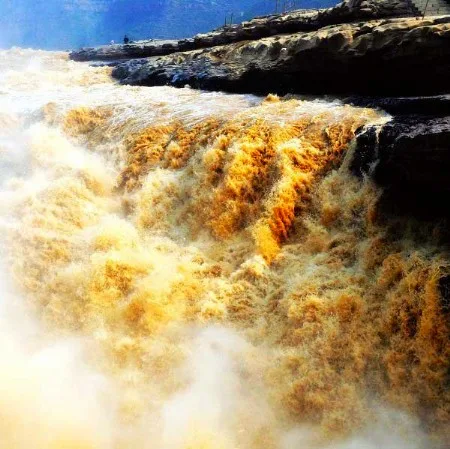The Courageous Koi at Dragon’s Gate
In China they tell the story of the Yellow Emperor, who became so angry at the wickedness of the humans that he decided to end their existence. Summoning the God of Rain, he commanded that the rain should never stop until the entire Earth was covered in water and all but a few of the offensive humans were all drowned. So began a Great Flood and every day the floodwaters rose until only the highest mountains were left. The Yellow Emperor’s grandson, Kun, managed to make a few safe havens with some stolen magic mud, but his supply ran out and the rains kept on falling. The Emperor’s anger had not yet abated and, for his disobedience, Kun was executed by the God of Fire.
 |
| River by Sandra buy here: http://sandara.deviantart.com/art/river-282659319 |
Kun’s son, Yu, was a golden yellow dragon, strong and beautiful, and he took up the task of saving humanity from the Great Flood. Yu spoke respectfully to the Emperor and described the suffering he had seen amongst the humans. His words softened the Yellow Emperor’s heart and he gave the golden dragon, Yu, the position of the new rain god. He also gave Yu enough magic mud to soak up all the water as well as the assistance of a Magic Tortoise to carry it for him.
 |
| River Dragon by Collette J Ellis buy here: http://collettejellis.deviantart.com/art/River-Dragon-187403101 |
Yu’s mighty Dragon Breath easily dispersed the storm clouds and deposed the old Rain God, who had revelled in making ceaseless rain. Once the last drop had fallen, Yu and the Magic Tortoise travelled the Earth dispensing magic mud and creating solid land once more until all the mud on the Tortoise’s back had been used.
Then, so that the rain would have a place to go, Yu created the rivers with swipes from his powerful tail. As Yu was digging the course of what was to become the Yellow River in the north he came across a place where some rocky cliffs blocked the flow of the water. Yu pondered for a moment then, with calculated ferocity, he directed one mighty blow from his tail at the cliffs, cutting a chasm through the hard rock. “I name this place ‘Dragon’s Gate’ and from this day forward it shall be sacred to Dragons.”
This was the origin of the great rivers that flow across China to this day.
 |
| Koi Dragon by Heather Bruton - buy here:http://hbruton.deviantart.com/art/Koi-Dragon-115108345 |
Seeing the new land, ready for planting, the people left their caves in the mountains and ventured down onto the fertile plains. In their gratitude they begged Yu to become their Emperor. Thus Yu, the Golden Dragon, became a Man-God and lived a long lifetime on the Earth, almost as long as he would have lived had he stayed as a Dragon. Under his guidance mankind grew knowledgeable in following the ways of Heaven and gained favour in the eyes of the Yellow Emperor.
 |
| Yu the Great Contols the Floods |
Dragon Emperor Yu is still honoured and remembered at the rapids of Dragon’s Gate on the Yellow River and the location still retains a touch of the magic it had at the beginning of time.
A certain type of carp, called a koi, gains their strength by swimming against the current. Not for the koi are the soft lives living in still ponds, for they seek out and revel in adversity. Thousands of years ago, before writing was invented in China, a huge school of thousands of koi swam up the Yellow River until they reached Dragon’s Gate. Most of the school grew discouraged seeing the roiling water and feeling the strong current that stood against them, and so they went back downstream to feast in the quiet waters of the lower river, leaving a small group of 360 stalwarts behind.
 |
| Hukou Waterfall |
 |
| Koi Dragon - tattoo design by Ed Delacruz buy here: http://browse.deviantart.com/art/Koi-Dragon-113644553 |
As he sailed through the air on his way over the water the Gods looked down with approval and transformed the flying fish into a shining golden dragon in the middle of his leap. The former carp was now a Dragon, the spitting image of Yu, the creator of Dragon’s Gate, himself. Flapping his new wings he continued upwards until he reached the clouds where he chased pearls of wisdom across the skies. Whenever another brave koi finds the strength and courage to leap the falls at Dragon’s Gate they, too, become a Heavenly Dragon.
 |
| Koi Dragon by Ben Wootten buy here: http://browse.deviantart.com/art/Goldfish-328055999 |
Because of their endurance and perseverance, koi have become the symbol of overcoming adversity and fulfilling one’s destiny. The Chinese word “carp” sounds similar to the word “business” and is also a homophone with “profit” or “advantage”. “Fish” sounds similar to “surplus” or “wealth”. Because of this word play, koi have also become associated also with good fortune in mercantile endeavours and paintings of them are a common decoration in shops and restaurants. And in the China of today there is still the possibility that a lowly shopkeeper may, by strength and courage, become a Dragon of Industry.
 |
| Koi Dragon Fish by Cortney DeSantis - buy here: http://mysticgaia.deviantart.com/art/Koi-Dragon-Fish-139476400 Posted by Steve Caunce |













